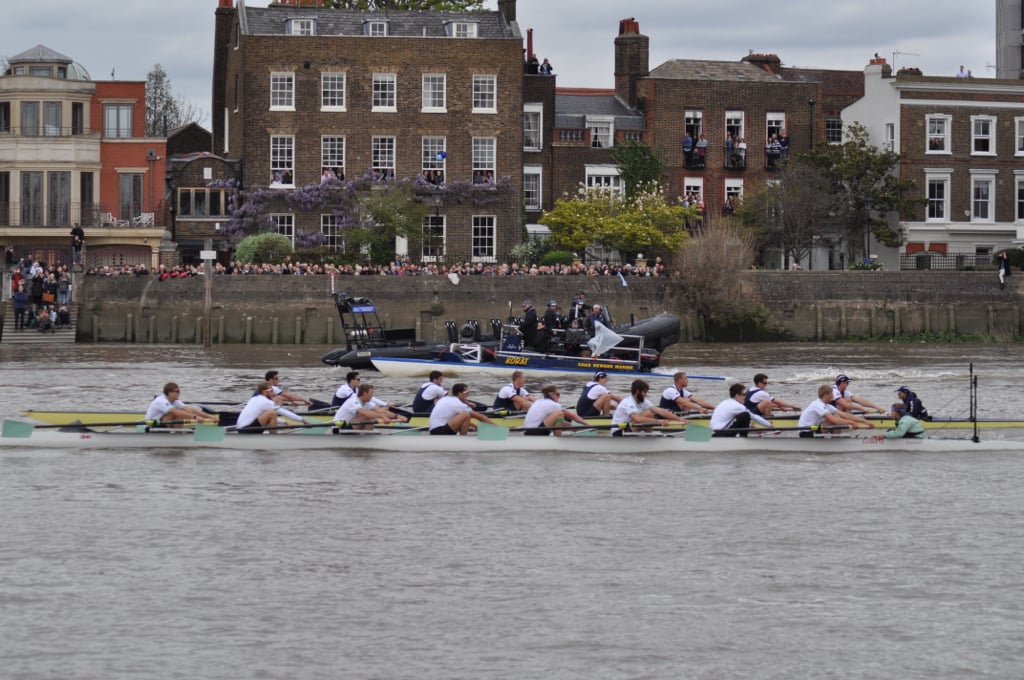This year the river Thames was home to the 167th men’s boat race between Oxford and Cambridge and the 76th women’s race. It was televised by the BBC for the 84th time with millions watching it at home on their televisions. Here in the UK, there is relatively little coverage of varsity sport in the mainstream media, especially in comparison to our neighbours across the pond. However, there is a major exception: The Boat Race. Regardless of your investment or involvement in rowing, it is an event akin to Wimbledon, key to signalling the incoming tide of British Summer Time. The BBC televises the event in a feature that runs for approximately two and half hours covering the races, interviews with key British rowing figures, and a halftime feature.
This year the halftime feature covered a new British Rowing initiative run by Rebecca Clephan, programme manager of London Youth Rowing. Clephan introduced a new programme run in Leeds that aims to get young people from diverse backgrounds into rowing. The feature was introduced by Kyra Edwards, a British rower of high acclaim, who has recently made her name, not in this year’s Olympics, but in advocating for increased diversity in the sport. However, her genuinely heartfelt interview, and the programme that followed it, seemed somewhat discordant with the rowing on display that day. In an interview with a BBC sports correspondent on the program, Edwards stated that ‘every single rower I know is down to earth, passionate and determined, yet all of us are absolutely unique and different’ and ‘there is a perception that rowing is exclusive but I don’t believe, for a second, that anyone in the rowing community believes that.’
These words and the Leeds initiative were then followed minutes later with the men’s 167th boat race, with both crews exclusively made up of tall, white men from Oxbridge, many Olympians in their own right. In contrast, Edwards, who did not make the Tokyo GB squad, but is seen by many as a strong contender for Paris 2024, would have been the first black member of Great Britain’s team. Edwards is herself from Nottingham but really developed her rowing career in North America at UCLA. She now lives with her partner Saskia Budgett, another member of the GB squad in the UK.
In a piece entitled ‘Generation Next: Kyra Edwards on tackling stereotypes and changing the face of rowing’, written by the BBC’s Nick Hope, Edwards stated that increasing diversity and accessibility in the sport would mean more to her than an Olympic medal. Fortunately, in the last decade, British Rowing has made an attempt to address some of the issues within rowing’s seemingly exclusive community. It has recently launched its own GROW initiative which funds coaches to work at local clubs in order to reach more young people, as well as already providing initiatives in Leeds and areas in London where involvement with the sport is low.
Similarly, it is important to remember how far British rowing has come in the last years through recognising the achievement and skill of its female rowers. Only in 2015 was the women’s boat race held on the same day as the men’s giving the two races equal standing for the first time in The Boat Race’s history. In 2022 astute watchers may have noticed that Oxford University Men’s Boat Club and Oxford University Women’s Boat Club were introduced in that format regardless of gender, rather than the typical OUBC and OUWBC. The same went for Cambridge, although it is interesting to note that, for Oxford at least, the official websites still go by their original titles.
British Rowing is undoubtedly moving in the right direction, however, whether it is moving with the appropriate speed and urgency is another matter. Despite Edward’s words, that the exclusivity of rowing is a ‘perception’, it is a perceived insularity that still has a great deal of concrete bias in our rowing community today. Take for instance the Henley Royal Regatta, a ticketed event, that is sponsored by Bremont Chenometers, Moet and Chandon Champagne, and the Crew Clothing Company. Not exactly a diverse list of companies that speaks to the needs of your average football fan for example. Although millions go to watch The Boat Race, The Henley Royal Regatta is like a day at the races, everyone dressed up to the nines. The cost of a rowing blazer worn by most athletes to this illustrious event is often upwards of £300. For many of these institutions keeping traditions alive is extremely important, and also part of the fun, but it undoubtedly comes with a hefty price tag.
Importantly, change in rowing, like change in any sector only makes serious progress when the institutions that contribute also change their outlook. Oxford University did not become entirely mixed gender in its collegiate system until 2008, with the vast majority of colleges choosing to admit only male undergraduates well into the twentieth century. Many who attend Oxford and Cambridge with a pre-existing passion for rowing are from public schools, largely because these are the schools that can fund such an expensive pass time, and because roughly 30% of Oxford’s intake is from non-state backgrounds, approximately six times the national average, according to The Times’s higher education department.
Undoubtedly British Rowing’s initiatives are a step in the right direction, but like many journeys towards inclusivity, it cannot be done alone. British Rowing’s valiant efforts will remain simply that, efforts, not results, until the culture that fuels these sports also take action. As a sport, we have made an important first step but there is still a way to go before we see more talented athletes like Kyra Edwards on our screens.
Image: ale/ CC BY-2.0 via Wikimedia Commons



